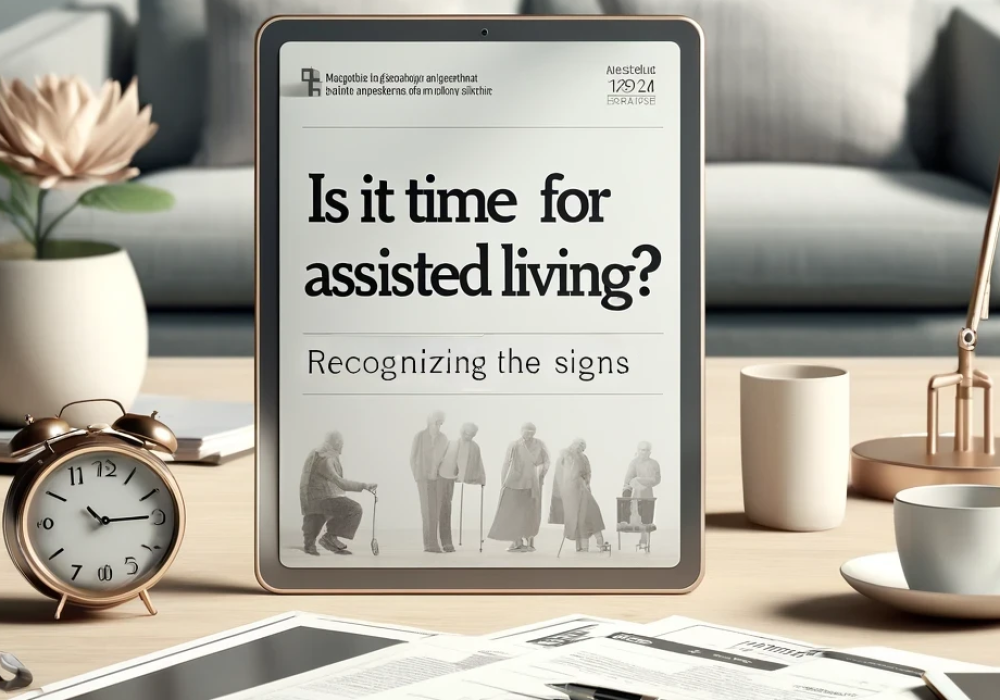Is It Time for Assisted Living? Recognizing the Signs

Is It Time for Assisted Living? Recognizing the Signs
With aging comes unique challenges, and for some individuals, the need for assisted living can become a necessary consideration. In this blog post, we will investigate the indicators that suggest someone might be in need of assisted living, drawing from both anecdotes and expert opinions. We will also explore the distinctions between minimal assistance and more intensive care, shedding light on when each may be appropriate.
Physical Signs of Needing Assistance
Mobility Challenges
While some individuals may only require minimal assistance with tasks such as getting dressed or preparing meals, others may experience more significant mobility challenges that indicate the need for assisted living. These challenges could include difficulty walking, frequent falls, or an inability to safely navigate stairs or uneven surfaces.
Increased Need for Medical Attention
To distinguish between individuals who may need minimal assistance and those who require more intensive care, it's necessary to pay attention to an increased need for medical attention. This could manifest as frequent doctor's visits, medication management issues, or difficulty adhering to a treatment plan.
Physical indicators such as unexplained weight loss, forgetfulness, or changes in behavior can also signal the need for additional support. For instance, if an elderly person experiences a significant decline in their physical or cognitive abilities in a short period, it may be time to consider assisted living options that can provide the necessary care and supervision.
Cognitive Indicators and Mental Health Considerations
There's a range of cognitive indicators that may suggest someone could benefit from assisted living. Memory impairments and confusion are common signs that loved ones might notice. Any difficulty remembering important dates, appointments, or recent events could indicate a need for more support.
Memory Impairments and Confusion
Impairments in cognitive function can manifest in changes in behavior and mood. Loved ones may notice increased agitation, frustration, or uncharacteristic outbursts. Any significant shifts in personality or behavior patterns should be taken seriously and may warrant further evaluation.
Assessing Daily Living Activities and Independence
Difficulty with Personal Care
Keep an eye out for signs indicating difficulty with personal care tasks such as bathing, dressing, grooming, and toileting. Individuals who struggle to complete these activities on their own or exhibit poor personal hygiene may be showing signs that they require additional assistance with daily living.
Struggles with Household Management
With regards to household management, pay attention to how well someone is able to maintain their living environment. Difficulty with tasks like cooking, cleaning, managing finances, and keeping track of medications can be indicators that someone may need assisted living support. For instance, an individual who consistently forgets to take important medications or experiences weight loss due to difficulty preparing meals may benefit from the services provided in an assisted living facility.
The Role of Family and Healthcare Professionals
Communication with Elders about Assisted Living
Despite the challenges, open and honest communication with elderly family members about the possibility of moving into an assisted living facility is crucial. Approach the topic with care and understanding, taking into account their wishes and concerns. Listen actively and involve your loved one in decision-making to ensure they feel empowered in the process.
Expert Opinions on Making the Transition
Role of healthcare professionals, such as geriatricians and social workers, is vital in assessing the level of care needed for individuals considering assisted living. These experts can provide valuable insights on the best course of action based on the individual's physical and cognitive abilities. They can help navigate the transition and support both the elderly person and their family through the process.
Elders may feel a range of emotions about moving to assisted living, from fear and anxiety to relief and acceptance. It's important for family members and healthcare professionals to acknowledge and address these feelings with empathy and understanding. Providing reassurance and maintaining clear communication can help ease the transition and ensure the well-being of the elderly individual.
This collaborative approach between family members and healthcare professionals is important in ensuring that the elderly person receives the level of care and support they need. By working together and considering expert opinions, the transition to assisted living can be a smoother and more positive experience for everyone involved.
Summing up
Conclusively, recognizing the signs that someone may need assisted living is a crucial step in ensuring their well-being and quality of life. From changes in mobility and personal care to cognitive decline and social isolation, it is important to pay attention to the indicators that suggest a transition to assisted living may be necessary. By understanding the differences between requiring minimal assistance and more intensive care, families can make informed decisions about the level of support needed for their loved ones. Consulting with experts and observing individual circumstances can help determine the most suitable option for assisted living, ultimately promoting comfort, safety, and overall satisfaction for those in need of extra care.